Updated Aug 31st! Songs about Peace and War
New and improved!
by music co-ordinator, Jeff Piker
- Suggested ‘songs suitable for children’: identified by plus-sign + next to song title.
- 2 new publications (identified in italics in the list).
- 12 new songs (identified in italics in the songlist).
Highlights: 2 more Buffy Sainte-Marie songs; ‘Walking for peace’ by Attawapiskat Youth (Youtube); outstanding song & video by California rap guy, Matre, ‘Listen’ (Youtube)…
All the new songs have been added to the ‘Songs about peace and war’ playlist/channel on Youtube. It has good versions of all 160+ songs. Updated songs have needed to get inserted down toward the end of the playlist.
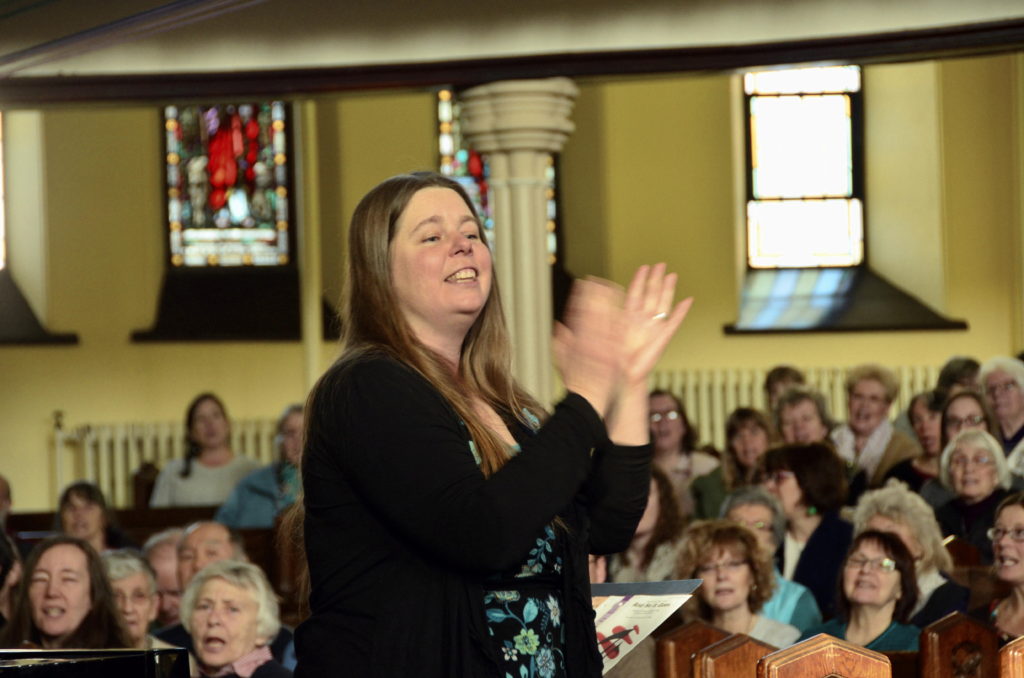
Wendy Luella Perkins is a Kingston singer-songwriter and music teacher. Here she is leading a song about peace, at a community sing-along organized by PeaceQuest-Kingston and Cantabile Choirs. It was held at Sydenham St. United Church in January, 2015. (Photo by Hilbert Buist.)
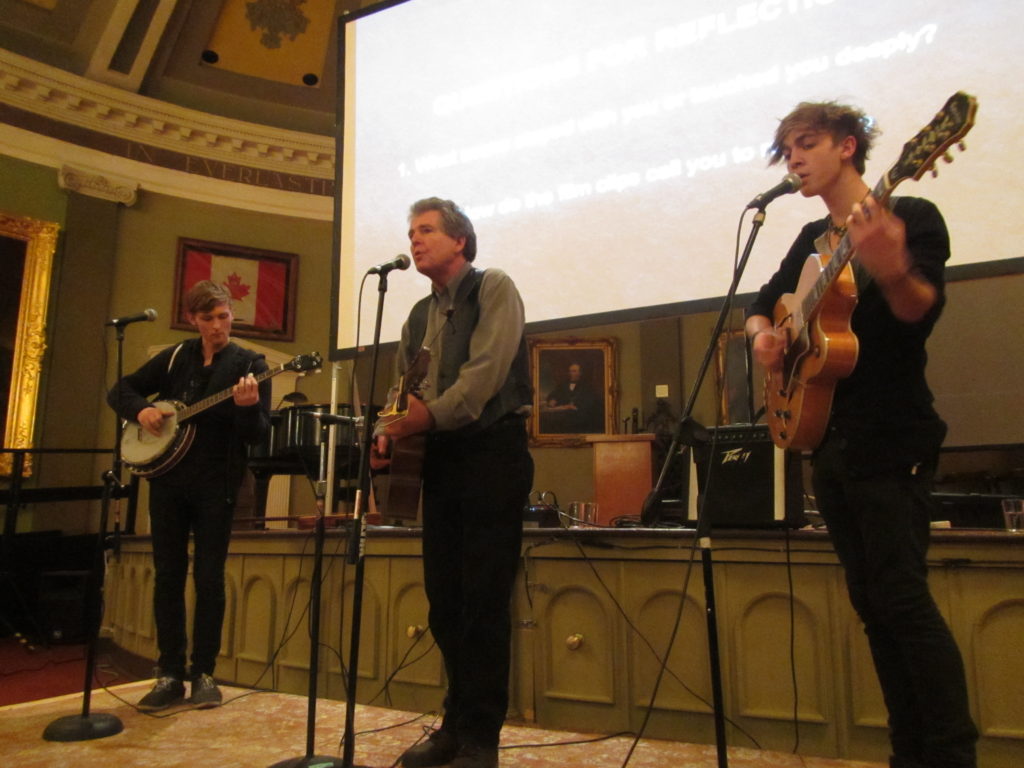
Kingston’s Al Rankin — backed-up by Liam Fenton on guitar and vocals and Kieran L’abbe on 5-string banjo — performs John McCutcheon’s song, ‘Christmas in the Trenches’, at an event organized by PeaceQuest-Kingston to remember the Christmas truces of 1914. It was held at Memorial Hall in December, 2014. (Photo by Jolene Simko.)
Introduction
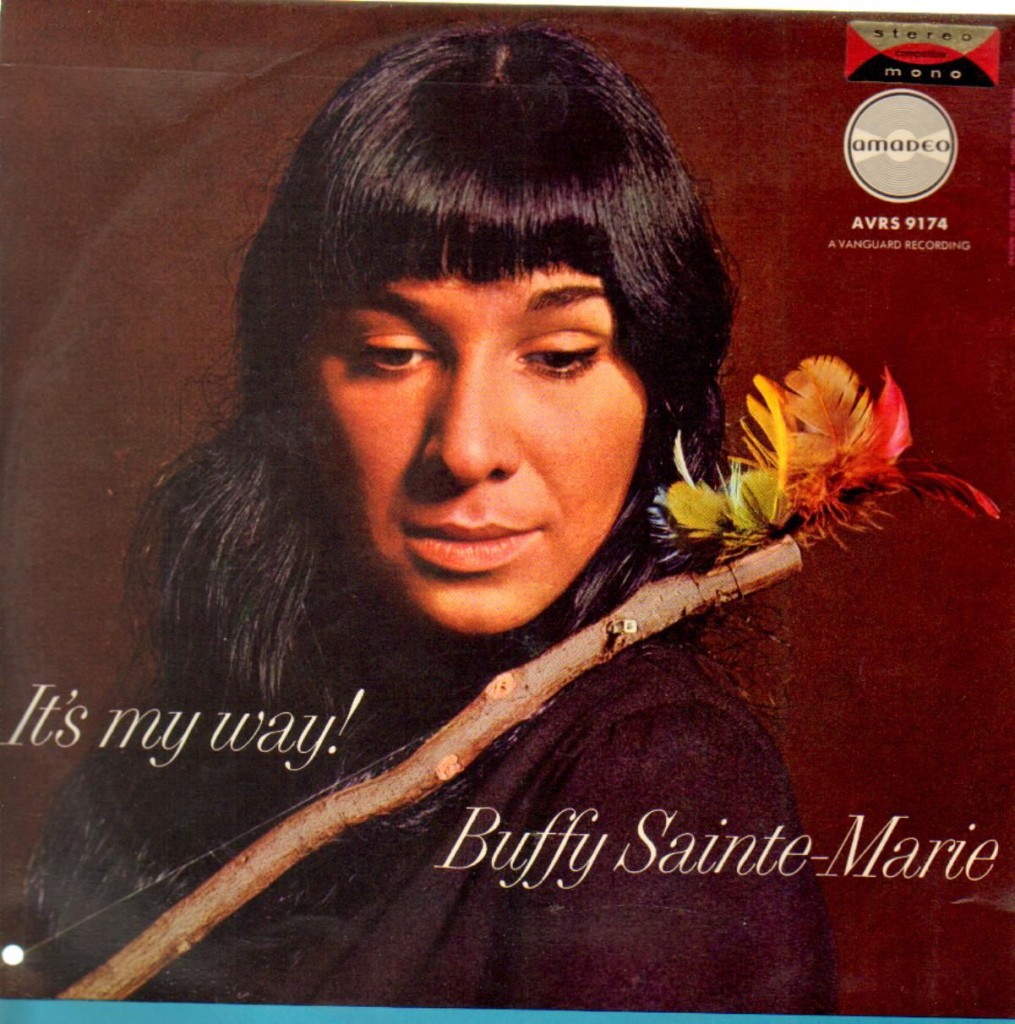 This is a list of more than 160 excellent songs about peace and war, plus eight published song collections. Some listed songs are recent songs, some are older (from the 1950’s, 60’s and 70’s), a few are traditional. Composers and dates of composition are listed for all the listed songs. (Canadian composers are identified in boldface.)
This is a list of more than 160 excellent songs about peace and war, plus eight published song collections. Some listed songs are recent songs, some are older (from the 1950’s, 60’s and 70’s), a few are traditional. Composers and dates of composition are listed for all the listed songs. (Canadian composers are identified in boldface.)
Music can make valuable contributions to peacework. Thankfully, it’s still happening — although not as regularly as during the ‘peace movements’ in North America and elsewhere during the Cold War. The list is intended to encourage and assist peace-workers to find ways to include music in their efforts.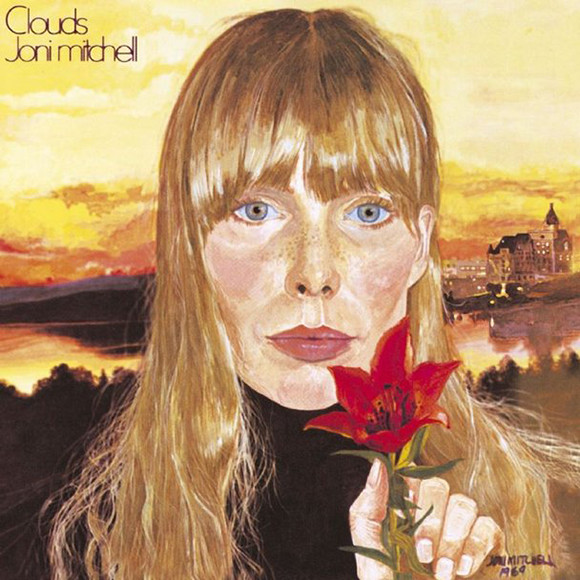
People connect with music in ways they might not connect with other kinds of presentations. More than a few musicians who sing about peace and war have commented that music is heartfelt. It can also be incredibly thought-provoking — valuable in educational settings of all kinds, for learners of all ages. Plus of course: as a common language, music is entertaining.
Good versions of nearly all the songs listed here can be found by searching on Youtube. (And don’t forget the Youtube playlist/channel of all the songs: here.) As well, words for almost every song can be found by on-line searching: in your search-engine, write the song title and add the word, lyrics. Similarly, chords can be found by the same search method — adding chords to the song title.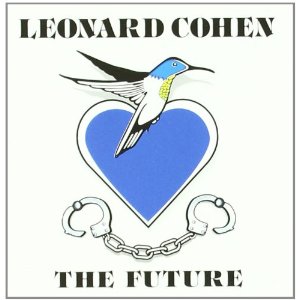
The list is a work-in-progress. To get it to this point, many resources were consulted, as well as many people familiar with songs about peace and war. Certainly there are gaps: more songs are needed for primary/junior-age children; almost none on the current list have francophone composers; the majority of the songs were composed by white men from the English-speaking world. So if you check the list from time to time, you’ll find increased variety.
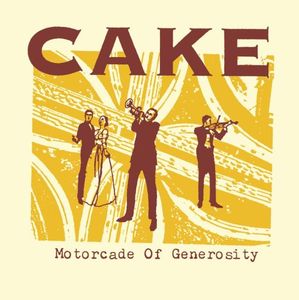 If you have songs and/or publications to suggest being added to the list, please do it — either in a ‘comment’ at the end of the website list (note: we love comments!), or by sending your suggestion(s) to the music co-ordinator of PeaceQuest-Kingston: jpiker@kingston.net
If you have songs and/or publications to suggest being added to the list, please do it — either in a ‘comment’ at the end of the website list (note: we love comments!), or by sending your suggestion(s) to the music co-ordinator of PeaceQuest-Kingston: jpiker@kingston.net
(Note: It’s helpful if a version of each song be available on Youtube or elsewhere on-line, and also if lyrics for the song are available on-line — so that people who aren’t already familiar with it can check it out.)
Thanks!
Publications of songs about peace and war
Before you get to the total list of songs, here is a short list of useful publications of songs about peace and war. A link is attached to each title on the list, which takes you to a website that provides information. (Additional links take you to other useful information for each item.) Thanks to Wendy Luella Perkins and Gary Rasberry (both are singer-songwriters, song-leaders and music teachers in Kingston) for their suggestions.
Earth and Spirit Songbook: An Anthology of Songs Celebrating Earth and Peace (Book One)
By Jim Scott (2003) — he lives in Shrewsbury, Massachusetts. The book includes 110 songs by a variety of composers. It is a resource for educators, song leaders, choirs, church musicians, etc. Full piano accompaniment is included for all songs.
Peace Songs: Some suggestions for a classroom Peacemaking theme unit
Contents include songs suitable for pre-school and elementary grades — by a variety of composers. The publisher is SongsForTeaching.com, with headquarters is Chandler, Arizona.
The index of song titles can be found here. The publisher is Children’s Music Network, with headquarters in Arlington, Massachusetts. There is a Canadian regional coordinator in Aurora, Ontario.
For people who love folk music (especially, the sing-along variety), this is perhaps the standard collection. The 15th Anniversary Edition was published by Sing Out! in 2005. In the ‘Peace’ section are thirty songs — including lyrics, chords and background notes. Conceived and edited by Peter Blood and Annie Patterson.
Includes approximately 100 peace song standards: melodies, lyrics and chords. A list of all songs can be found here. Compiled and edited by Cliff Metzler, Jeff Harris and Pete Seeger. An Oak Archives publication (2006 — first edition in 1966).
Songs of Peace, Freedom and Protest
A history of social protest in song, the book was collected and edited by Tom Glazer and contains over 150 selections. Glazer was a U.S. folk singer, song-writer and collector. He died in 2003. Publisher is Fawcett (Greenwich, Connecticut)
Songs of Peace, Hope and Love — A Big Note Songbook
There are 34 songs by various composers, arranged for piano, vocals and guitar. A link at the website shows the entire list of songs. Published by Hal Leonard Corporation (‘the world’s largest music print publisher’ — in Milwaukee, Wisconsin).
Teaching Peace — Songbook and Teacher’s Guide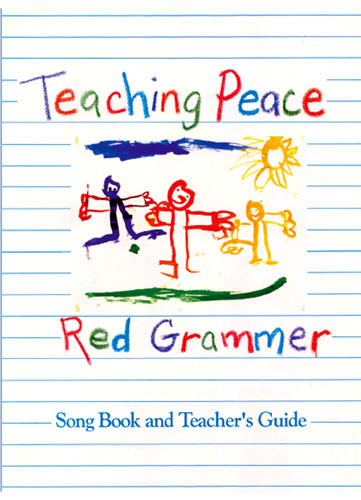
Songs by Kathy and Red Grammer. Piano/vocal arrangements by Christine Wu. Teacher’s Guide by Kathy Grammer et al. Published by Smilin’ Atcha Music (1993). Table of contents and songs ‘preview’ can be found at the link.
Songs about peace and war
(Notes: Songs in italics are new in this updated list. Songs preceded by a plus-sign + are ones suggested for use with younger children. Composers whose names are in bold are Canadian.)
+ Across the bridge of hope — poem: Sean McLaughlin (1998); melody: Jan Sandström (date unknown)
After the war — by Paul Gross & David Keeley (2011)
And so it goes — Hollerado (2013)
And the band played ‘Waltzing Matilda’ — Eric Bogle (1972)
Anthem — Leonard Cohen (1992)
Apache tears — Johnny Cash (1964)
The ballad of Penny Evans — Steve Goodman (1971)
The battle of Cape Henry — Todd Snider (2008)
Battleship of Maine — traditional (versions of it differ in meaning & interpretation)
Beautiful thing — Slaid Cleaves (2010)
Belfast child — Simple Minds (1989)
Between the wars — Billy Bragg (1991)
+ Blowin’ in the wind — Bob Dylan (1963)
Bomb the world — Michael Franti & Spearhead (2003)
Born in the U.S.A. — Bruce Springsteen (1984)
Born on the Fouth of July — Tom Paxton (1976)
Bring ’em home — Pete Seeger (1965)
Broken peace — Martyn Joseph (2010)
Brothers in arms — Mark Knopfler (Dire Straits – 1985)
Bury my heart at Wounded Knee — Buffy Sainte-Marie (1992)
Buy a gun for your son — Tom Paxton (1965)
Call it democracy — Bruce Cockburn (1986)
Cheney’s toy — James McMurtry (2008)
Christmas in the trenches — John McCutcheon (1984)
+ Crow on the cradle — Sydney Carter (1962)
The cruel war — traditional
Dandelions — Steve O’Donoghue (2016)
The day after tomorrow — Tom Waits (2004)
Devils and dust — Bruce Springsteen (2005)
+ Dona nobis pacem (Latin: ‘Bring us peace’) — traditional
Don’t drop that bomb on me — Bryan Adams & Robert ‘Mutt’ Lange (1991)
Don’t take your guns to town — Johnny Cash (1958)
+ Down by the riverside (aka: Study war no more) — traditional (first published in 1918)
Edmonton — Tannis Slimmon (2007)
Eve of destruction — P. F. Sloan (1964)
Feel like I’m fixin’ to die rag — Country Joe McDonald (1965)
The fiddle and the drum — Joani Mitchell (2004)
Five sisters — Martyn Joseph (2009)
+ Fly little white dove fly — The Bells (1971)
The fortunate son — John Fogerty (1969)
For what it’s worth — Buffalo Springfield (1966)
Freedom has beckoned — Four the Moment (1987)
The future — Leonard Cohen (1992)
Galveston Bay — Bruce Springsteen (1995)
Get together — Chet Powers (early 1960’s)
Give peace a chance — John Lennon (1969)
The good in me is dead — Martyn Joseph (1999)
Goodbye blue sky — Pink Floyd (The Wall – 1979)
Going Home — Fred Smith (2013)
The great American novel — Larry Norman (1975)
Green fields of France (aka: No man’s land, Willie McBride) — Eric Bogle (1976)
Gypsy biker — Bruce Springsteen (2007)
Happy xmas (war is over) — John Lennon & Yoko Ono (1971)
+ Heal the world — Michael Jackson (1991)
Heroes — Mika (2012)
Hiway 9 — Eliza Gilkyson (2003)
How did we end up here — Martyn Joseph (2005)
+ Hymn for (the) nations — words: Josephine Bacon (1940); melody: Beethoven, ‘Ode to joy’ (1824)
I ain’t marching anymore — Phil Ochs (1965)
I bombed Korea — Cake (1994)
+ I come and stand at every door — words: Nazim Hikmet; melody: ‘The great (or grey) silkie’; adapted by Pete Seeger (1972) note: very serious theme, can ‘speak’ to children
I didn’t raise my boy to be a soldier — lyrics: Alfred Bryan; music: Al Piantadosi (1915)
+ If we only have love (Quond on n’a que l’amour) — Jacques Brel (1957)
+ If I had a hammer — Lee Hays & Pete Seeger (1949)
If I had a rocket launcher — Bruce Cockburn (1983)
If you tolerate this, your children will be next — Manic Street Preachers (1998)
+ Imagine — John Lennon (1971)
In Flanders fields — Jon Brooks (2007 — based on the McCrae poem)
In the hills of Shiloh — Shel Silverstein & Jim Friedman (1963)
It’s going down slow — Bruce Cockburn (1971)
+ I’ve got peace in my fingers — Susan Salidor (1995)
I wanna be in the cavalry — lyrics: Corb Lund; music: Stan Rogers (2007)
I want peace — Peter Buttita & Jay Rehak (2008)
Johnny I hardly knew ye — traditional Irish
John Walker’s blues — Steve Earle (2002)
Last to die — Bruce Springsteen (2007)
Last letter home (aka: Rose in a Spanish garden) — Butch McDade (1977)
+ Last night I had the strangest dream — Ed McCurdy (1950)
Let me die in my footsteps — Bob Dylan (1962)
+ Let there be peace on earth — Jill Jackson Miller & Sy Miller (1955)
Let’s get together — Chet Powers (early 1960’s)
Listen — Matre (2015)
Livin’ in the wasteland of the free — Iris DeMent (1996)
Living with war — Neil Young (2006)
Lost in the flood — Bruce Springsteen (1973)
Love and understanding — Jim Cuddy & Greg Keelor (Blue Rodeo – 1989)
Manzanar — Tom Russell (1993)
Masters of war — Bob Dylan (1963)
The mines of Mozambique — Bruce Cockburn (1995)
Mothers, daughters, wives — Judy Small (1982)
My country ‘tis of thy people you’re dying — Buffy Sainte-Marie (1966)
My kind of war — Rita Marley (2005)
My name is Lisa Kavelage — Pete Seeger (1998 ?)
+ My peace — lyrics: Woody Guthrie (date unknown); music: Arlo Guthrie (published: 2003)
My son John — Tom Paxton (1966)
Nagasaki nightmare — Crass (1982)
Never mind — Leonard Cohen (2014)
No more genocide — Holly Near (1972)
No nuclear war — Peter Tosh (1987)
Nothing more — the Alternate Routes (2014)
Now that the buffalo’s gone — Buffy Sainte-Marie (1964)
Old man atom — Vern Partlow (1945)
+ One tin soldier — Dennis Lambert & Brian Potter (1969)
One word (peace) — John Magnie & Tommy Malone (the Subdudes – 2006)
+ The Patriot’s Dream — Gordon Lightfoot (1972)
+ Peace call — lyrics: Woody Guthrie (1951-3); music: Eliza Gilkyson (2003)
+ Peace train — Cat Stevens (1971)
Peace will come — Tom Paxton (1977)
The peddler — Maria Dunn (2003)
Quand les hommes vivront d’amour — Raymond Levesque (1956)
Requiem for the Masses — Terry Kirkman (The Association – 1967)
Rich man’s war — Steve Earle (2004)
Road to peace — Tom Waits (2006)
Rosie, the riveter – revisited — Linda Allen (1984)
+ Sempre vicino (A child’s prayer for peace) — Jill Ann Siemens (2002)
Shed a little light — James Taylor (1991)
+ Shule arun (aka: Shule aroon, Siuil a run) — traditional Irish folk song; similar to the traditional English folk song, Johnny has gone for a soldier (aka: Buttermilk Hill)
Shut out the light — Bruce Springsteen (1984)
+ Simple song of freedom — Bobby Darin (1969)
Soldier blue — Buffy Sainte-Marie (1971)
+ Song for peace — Kitaro (1997)
A song of peace — Teresa Jennings (2009)
Sticks that made thunder — Mike Henderson & Chris Stapleton (SteelDrivers — 2008)
Story of Isaac — Leonard Cohen (1969)
Sunday bloody Sunday — U2 (1983)
Sweet child — Shards of Jade (2011)
Swansea — Martyn Joseph (1992)
+ Talk about peace — Joe Hampson (the Travellers — 1970)
Teaching peace — Red Grammer (1986)
Tender Mercies — Eliza Gilkyson (2003)
That’s the news — Merle Haggard (2003)
There but for fortune — Phil Ochs (1964)
There’s a wall in Washington — Iris DeMent (1996)
There’s always money for a war — Shelley Posen & Ian Robb (2015)
These hands — Dave Gunning & George Canyon (2012)
This is Baghdad — Bruce Cockburn (2006)
This is my song — music: Jan Sibelius (1899); lyrics: Lloyd Stone (1934)
This world over — XTC (1984)
Travelin’ soldier — Bruce Robison (1996 – rewritten 1999)
Universal soldier — Buffy Sainte-Marie (1964)
+ Voices of peace — Jim Scott (2013)
Waist deep in the Big Muddy — Pete Seeger (1967)
+ Walking for peace — Attawapiskat Youth (2016)
The wall — Bruce Springsteen (2003)
War — Bob Marley & the Wailers (1976)
War — Edwin Starr (Whitfield & Strong – 1969)
War baby — Tom Robinson (1983)
The war is over — Phil Ochs (1968)
Warrior — Steve Earle (2004)
War song — Neil Young & Graham Nash (1972)
The war song — Boy George (1984)
We want peace — Lenny Kravitz (2004)
+ We Want Peace — Wayan Honarjo (2013)
We were all wounded at Wounded Knee — Redbone (1973)
What are you fighting for — Phil Ochs (date?)
+ What the world needs now — Hal David & Bert Bacharach (1965)
(What’s so funny ’bout) peace, love & understanding — Nick Lowe (1974)
+ Where have all the flowers gone — Pete Seeger & Joe Hickerson (1961)
White bones of Allende — Tom Paxton (1977)
The willing conscript — Tom Paxton (1963)
With god on our side — Bob Dylan (1964)
Woodstock — Joani Mitchell (1970)
The words that maketh murder — PJ Harvey (2011)
Yet still this will not be — Martyn Joseph (2005)
Your flag decal won’t get you into heaven anymore — John Prine (1971)
Zombie — The Cranberries (1994)
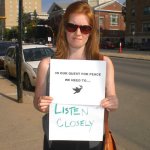
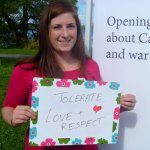
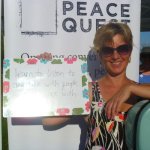
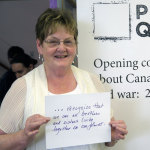
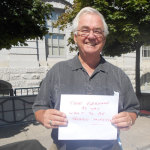
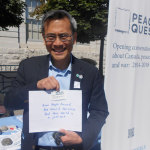
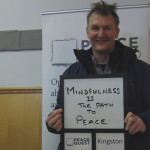
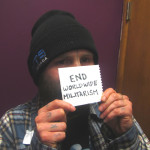
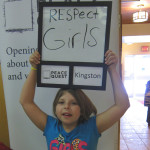

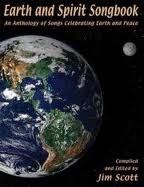

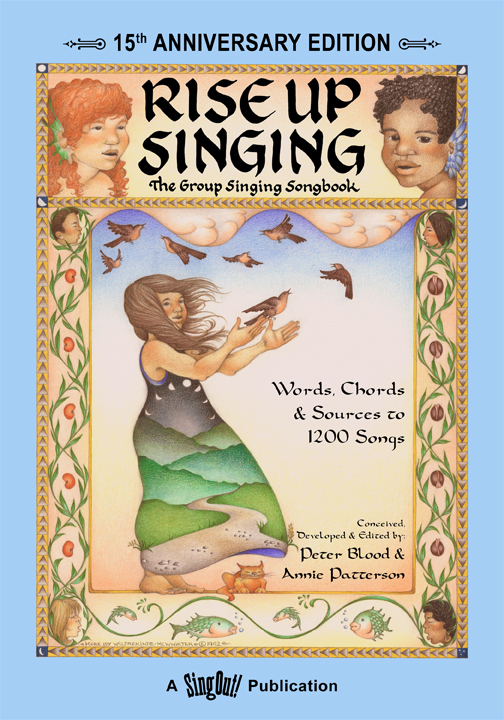
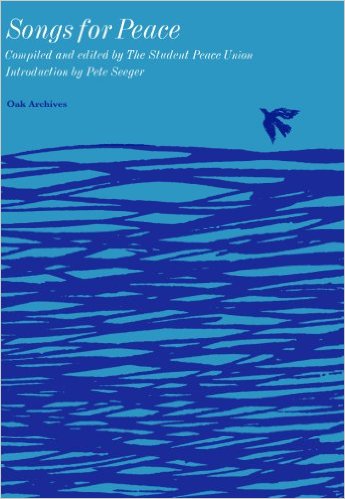
Naomi H
May 6, 2015 @ 8:00 pm
What about “praise the lord and pass the ammunition”?
It’s from the 1940s. Not sure who it’s by but it’s on the bioshock soundtrack.
Jolene Simko
May 7, 2015 @ 1:16 pm
Interesting choice Naomi. I have forwarded your suggestion to Jeff Piker, who is in charge of maintaining the list.
I looked it up and this song seems to promote war, or perhaps at best, is satirical. What do you think the lyrics mean?
And did you read the comments under the youtube video? https://www.youtube.com/watch?v=LJfJPxLntZU
Jeffry Piker
May 7, 2015 @ 3:48 pm
Hi Naomi:
Many thanks for your comment and song suggestion. Having grown up in the U.S. in the 1940’s and 1950’s, I well remember that song — as a kind of celebration of war waged by the U.S. military. The song was actually written in 1942 by Frank Loesser (of “Guys and Dolls” fame, etc.). The version by the bandleader, Kay Kyser (whom I also remember), reached #1 on the chart in 1943.
As you’re perhaps aware, PeaceQuest-Kingston has two main goals: ‘Opening conversations about Canada, peace and war’; and ‘Grieving the tragedy of war, Committed to the promise of peace’. Your suggested song fits nicely into the first goal — as for example, this on-line ‘conversation’ that your suggestion has stimulated. However it doesn’t fit into our second goal — because the song is really a celebration of the U.S. military engaging in war: “Praise the Lord and pass the ammunition…and we’ll all stay free”. When I next update the list (likely not for a few months), I doubt that song will be on it.
In order to make the list more ‘user-friendly’, however, I intend to re-organize the songs under particular categories — so that people can have an easier time searching for songs which suit their purposes.
It occurs to me that one possible category (perhaps included as an appendix to the list) might be (something like): ‘Songs which glorify and celebrate war’. In addition to “Praise the Lord…”, I’m thinking of such songs as Barry Sadler’s “Ballad of the Green Berets”, the anthems of the various branches of the U.S. military (e.g., “U.S. Marine Corps Hymn”, etc.), “The Battle Hymn of the Republic”…and there are many more. Such a category might be useful for people doing peacework, by providing to them ways to focus on the production of ‘warrior nation’ culture. Yet my immediate attention is on the current list and its possible contributions to peacework, so that ‘other’ category is not high on my agenda right now.
Thanks again for taking the time to give us your suggestion. It’s much appreciated. If you have further ideas or comments, please post them as well.
Gene Donefer
September 16, 2015 @ 12:07 am
I was surprised to find the song “Last Night I had the Strangest Dream” missing from your list of Peace Songs. Written by Ed McCurdy born in the U.S. but spent most of life living in Canada. It has been translated into 75 languages.
Jeff Piker
September 16, 2015 @ 6:55 pm
Thanks for your suggestion, Gene. Actually, the song is already on the list and has been there from the start. It’s title is ‘The strangest dream’.
Gene Donefer
September 16, 2015 @ 12:17 am
Regarding the Irish classic “Johnny I Hardly Knew You” the date written/ published is 1867.
I suggest a public event in Kingston, featuring playing/singing of “Peace Songs”
Jeff Piker
September 16, 2015 @ 7:26 pm
Thanks for your information about ‘Johnny I hardly knew you’. I’ll search out what I can find about origins and see if I can confirm the date you’ve given.
Thanks also for your suggestion of a public event in Kingston featuring ‘peace songs’. PeaceQuest-Kingston organized two sing-alongs in the past year — one on last Remembrance Day (with the help of Andy Rush, director of Open Voices Community Choir), the other in late January (with the help of Mark Sirett, director of Cantabile Choirs, and David Melhorn-Boe, music director at Chalmers United). In addition, there was a public event at Memorial Hall early last December to commemorate the Christmas truces in W. W. I, and several peace songs were sung there. (You can see a video of the performance of one of those songs, ‘The greenfields of France’, on this website, by looking in the ‘Guest Blogs’, p. 2.)
We try to include music about peace and war in many of our public events. As well, we try to encourage local musicians to include songs about peace and war in their performances. We’re currently partnered (along with Kingston Community Health Centre) with fine local musician, Wendy Luella Perkins, in support of her imaginative PeaceSong project — I’m guessing a public event might come out of that initiative.
Next Monday, Sept. 21, local musician Tracie Morgan (and other excellent local musicians) will be performing a tribute to the music of Leonard Cohen at 7 p.m. at Kingston Unitarian Fellowship. Tracie is well aware that’s International Day of Peace, so I’m guessing some of Cohen’s several songs about peace and war will be performed. (PeaceQuest Kingston supports that event, but we haven’t been involved in its organization.)
These are a few of the ways we make ongoing effort for public events in and around Kingston to include music about peace and war. I’m sure we’ll keep doing so — and before long, we’ll likely start to plan another public sing-along. Hope you can be there.
Gene Donefer
December 19, 2015 @ 12:36 am
As a teenager in New York city in the 1940’s, I was witness to the so-called Folk Music revival and more specifically the “Protest Song Movement, going to many hootenannies with Woody, Pete, Lead Belly …performing. In Dec.2014, I did a 1-hr presentation on Queens U. FM illustrating NYC-based folk singers and folk songs of the ’40’s.
Jeff Piker
January 4, 2016 @ 1:00 pm
The right time and the right place, Gene. Those were three incredible folk musicians, mainstays of protest music and the folk revival. Wonderful memories for you, no doubt.
Arleigh Crawford
January 14, 2019 @ 10:17 pm
I recently stumbled on What If We All Stopped Paying Taxes? by Sharon Jones and the Deptones. Released just before the 2002 US election it was a protest song against war in Iraq. You can find videos of the song on YouTube.
Here is a sample of the lyrics:
Now tell me who’s -gonna buy their bombs
Their tanks, their planes and all their guns
Well, tell me who’s -gonna pay for their wars
If we all get together and -cut their funds..
Listen people, listen to what I got to say
What if we all – stopped paying taxes?
Now, what if we all – stopped paying taxes?
Stop paying taxes y’all